The Palestinians have awarded their medical of courage to a refugee who was shot in the head while trying to stop a gunman and suicide bomber in the northern Lebanese city of Tripoli last week.
Palestinian President Mahmoud Abbas called 33-year-old Saber Murad in hospital where he remains with head injuries after he stopped the gunmen who opened fire, killing two soldiers and two security officers.
He also drove his car in the way of the gunman, named as Abdulrahman Mabsout, and his motorcycle to stop the attack. The attacker detonated a suicide vest when surrounded in a residence by troops.
“He asked the Ambassador of the State of Palestine to Lebanon, Ashraf Dabour, to take care of him, supervise his treatment and provide his family with all what it needs as a result of this brave heroic act,” Palestinian news agency Wafa said.
He remains in a stable condition but has a bullet lodged in his head.
"Thank God that the bullets in his back did not hit his spine," his father Nasser told Wafa.
The hero had previously emigrated to Australia but returned to Lebanon to settle permanently, according to his father.
Lebanese Interior Minister Raya Al Hassan described the assault as a “lone wolf attack”. Authorities subsequently cancelled Eid Al Fitr celebrations in the coastal city the day following the attack.
He had been in prison for a year in Lebanon for membership of ISIS. The group that controlled larges swathes of territory in Iraq and Syria between 2014 and March this year has not claimed responsibility for the attack.
Lebanon has largely avoided attacks by ISIS militants since 2016 but as it neighbours Syria it has been vulnerable to sleeper cells or sympathetic fighters crossing its borders.
"Can I tell you we can curb it 100%? We can't curb it. Countries that are perhaps more advanced than us have not been able to," Ms Al Hassan told a press conference.






